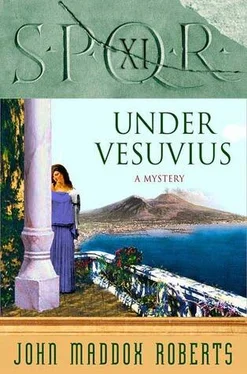John Roberts - Under Vesuvius
Здесь есть возможность читать онлайн «John Roberts - Under Vesuvius» весь текст электронной книги совершенно бесплатно (целиком полную версию без сокращений). В некоторых случаях можно слушать аудио, скачать через торрент в формате fb2 и присутствует краткое содержание. Жанр: Исторический детектив, на английском языке. Описание произведения, (предисловие) а так же отзывы посетителей доступны на портале библиотеки ЛибКат.
- Название:Under Vesuvius
- Автор:
- Жанр:
- Год:неизвестен
- ISBN:нет данных
- Рейтинг книги:3 / 5. Голосов: 1
-
Избранное:Добавить в избранное
- Отзывы:
-
Ваша оценка:
- 60
- 1
- 2
- 3
- 4
- 5
Under Vesuvius: краткое содержание, описание и аннотация
Предлагаем к чтению аннотацию, описание, краткое содержание или предисловие (зависит от того, что написал сам автор книги «Under Vesuvius»). Если вы не нашли необходимую информацию о книге — напишите в комментариях, мы постараемся отыскать её.
Under Vesuvius — читать онлайн бесплатно полную книгу (весь текст) целиком
Ниже представлен текст книги, разбитый по страницам. Система сохранения места последней прочитанной страницы, позволяет с удобством читать онлайн бесплатно книгу «Under Vesuvius», без необходимости каждый раз заново искать на чём Вы остановились. Поставьте закладку, и сможете в любой момент перейти на страницу, на которой закончили чтение.
Интервал:
Закладка:
Oho, I thought. Here's a new factor. "You mean other men besides Diocles may have had a reason to kill him?"
She erupted in tinkling laughter. "A jealous husband? Here? Not likely! As long as the wife was discreet, the husband would just try to parlay the affair into a business advantage. This isn't Rome, Praetor."
"As I am being reminded constantly. Did your husband or Diocles have business dealings with Gaeto? Not implying any impropriety on your part, of course."
"Only on the most mundane level, I think. Gaeto dealt in high-quality slaves, so he would want to present them to best advantage. That would mean perfumes and scented oils, especially for the house servants and entertainers. And he was princely in gift giving, especially with his African and Asian contacts. I believe he regularly ordered assortments of the costliest scents for that purpose."
"Do you know of anyone besides Gaeto who might have been involved with Gorgo?"
She pursed her mouth and arched her eyebrows. "As far as I know, she was as blameless as her eulogy would have it."
"Is anyone ever that blameless?" I asked.
"Never. But she lived a rather secluded life out there in the temple. We never mixed much with them except at municipal banquets and that sort of event. They're local aristocracy, or fancy themselves so, too well-bred for the likes of us." She laughed again. "If that's how aristocrats live, you can have it!"
"I couldn't agree more, though I'm something of an aristocrat myself. In Rome we like to affect a taste for the simple, rural life. In truth, we'd all love to live like Lucullus, if only we could afford it."
"You're not doing too badly," she said. "Old Hortalus's villa is said to be the finest in Italy."
"Alas, it's just a loan. Before long, I'll have to go down to Bruttium and you know how miserable that's going to be. It's like Rome two hundred years ago and I'll be surrounded by Bruttians."
"It is a backward place," she agreed. "Actually, you should be grateful these murders have occurred. It gives you an excuse to prolong your stay." She looked up under her thick eyelashes and smiled slyly.
"By Jupiter, you're right. I suppose that makes me a suspect."
"I think I would commit murder to stay in Baiae and out of Bruttium!" she said, bursting into laughter again. She had been into the wine before she joined our table.
"I still wonder, though," I went on, "why the men deferred to him so. Only a small minority would have found in him the same attractions the women did."
"More than you would think," she said. "But you are right. The fact is, many of Baiae's noblest had business dealings with Gaeto. Very deep, important business dealings. Some of our most impeccably respectable citizens are involved in extremely dirty dealings."
"What sort of dealings?" I asked.
She leaned forward on her elbows in a parody of intimacy. "It's all about using money to get more money, Senator. That's what business is. You Roman aristocrats like to pretend that the only respectable sources of wealth are land and plunder in war. The businessmen here prefer the luxury trades. But you and they know the truth: The greatest source of wealth is human flesh. And the only true power is absolute dominion over human flesh." The worldly cynicism in her eyes was an unsettling thing to behold.
"Go on," I said, through with clever banter.
"Do you know why everyone despises the slaver? Because he reminds us that we are all slavers. Where would our empire be without slaves?"
"We wouldn't have an empire," I answered. "We wouldn't have a civilization."
"Exactly. They grow our food, and then they cook it and serve it to us and clean up afterward. They build our houses and tend our baths. They provide us with fornication and when we tire of them, we can sell them off. They race chariots for our amusement and die in our arenas for the same purpose. They teach our children and tend us in our illnesses."
"It's hard to imagine a decent life without them," I agreed.
She sat back with a depraved smile. "We consume them, Praetor, just as surely as if we were cannibals eating their flesh. We dangle before them the prospect of freedom to keep them pacified and ensure more willing service, but the whip and the cross are always there just in case kind treatment and prospective freedom aren't enough."
"It's the price of losing wars and choosing the wrong parents," I said. "Been that way since Deucalion's Flood. What is your point?"
"That we all know it's true and it shames us. So we've singled out the slaver, the man who buys and sells the flesh, to bear the brunt of social disdain while we all merrily profit from his business. If it came out that some of our most revered public figures were silent partners with our richest but most despised resident, certain reputations would be sullied for-ever.
This tickled my memory, suggested some question that had eluded me or that I had failed to ask. But she went relentlessly on and the moment passed.
"There are worse things than being a slave, Praetor, and I've been some of them. Luckily, it was only temporary and now I'm a great lady again. Some things can be covered over and forgotten. Others can't. Bear that in mind while you look into these killings."
"I shall do so," I assured her.
Abruptly she dropped the serious discussion and resumed the gossipy banter more suitable to the situation. A few minutes later her litter arrived and she made her good-byes.
"Well," I said to Hermes as we resumed our lunch, "what do you make of that?"
"Another woman muddying the waters. Probably trying to throw you off her husband's scent and onto someone else."
"What she said about slaves-what do you think?"
He shrugged. "She didn't say much I can argue with. But it's the way of the world, isn't it? Short of the gods coming down from Olympus and taking a hand in things, how are you going to change anything?"
"How, indeed?"
9
"Why can't things ever be simple?" I lamented.
"Because people are involved," Julia informed me. "I think natural phenomena are relatively simple and predictable. When people with their passions and hatreds and ambitions are involved, things get complicated."
We were sitting in one of the lovely outer gardens of the villa. The bees buzzed pleasantly among the blossoms, the fish splashed vigorously in the ponds, the birds sang prettily in the trees, the mountain smoked ominously in the distance.
"I wish that was predictable," I said, pointing a finger toward Vesuvius.
"As far as I know, volcanoes are as unpredictable as the whims of the gods," Julia said.
"Do you think all the most prominent people here were in league
with the late Gaeto? Have they all been making illicit profits from the slave trade?"
"The day I believe a word one of those women says, you have my permission to bury me alive like a promiscuous Vestal."
"I thought so. At least we know now that Gaeto gave her the necklace."
"We know that Gaeto bought the necklace from the jeweler," she corrected me. "It might have been through other hands in the interim."
"Your logic, as always, is better than mine," I admitted.
"What are we going to do about Gelon?" she asked.
"I have to allow him to see to his father's funeral," I told her. "It would be inhumane to do otherwise."
"I agree, but he will have to be kept under close watch."
"Hermes and Marcus and some of the others can ride escort. I doubt the boy will try to escape. Where can a Numidian hide in Italy? And he couldn't get to a ship in time to elude me."
"I hope that is true. It would be a great embarrassment if he were to get away." She added, "And you are going to have to set a trial date soon. It won't look good if you stall much longer and duty calls you elsewhere."
Читать дальшеИнтервал:
Закладка:
Похожие книги на «Under Vesuvius»
Представляем Вашему вниманию похожие книги на «Under Vesuvius» списком для выбора. Мы отобрали схожую по названию и смыслу литературу в надежде предоставить читателям больше вариантов отыскать новые, интересные, ещё непрочитанные произведения.
Обсуждение, отзывы о книге «Under Vesuvius» и просто собственные мнения читателей. Оставьте ваши комментарии, напишите, что Вы думаете о произведении, его смысле или главных героях. Укажите что конкретно понравилось, а что нет, и почему Вы так считаете.









